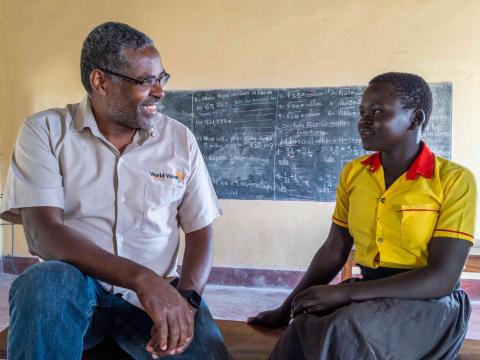New way of leading in the time of the COVID-19 pandemic: Isolated yet together

The World Health Organization (WHO) guidelines for COVID19 prevention, self-isolation requires a person who has traveled from a country affected by the pandemic to separate from others, with the purpose of preventing the spread of the coronavirus.
When I came back to my duty station in Juba after a trip to Nairobi, Kenya, I was in this category of having a “history of travel to any country with local transmission”. Upon arrival in South Sudan, I went through the mandatory self-isolation of 14 days in the World Vision team house.
My family pled for me to stay and coordinate efforts from home. But as the country director leading World Vision’s humanitarian programs in South Sudan, this time of the pandemic is a crucial time to be back with my team.
The isolation was a good preventive measure not to bring any risks of the virus in the country and with anyone. But being close enough to lead the work was a commitment I felt I need to do as a leader.
As of this writing, there was no confirmed case of COVID 19 in South Sudan, one of the four countries in the African continent which has not declared a case. Most of World Vision’s programs are ongoing but with more extensive hygiene and sanitation interventions such as the provision of handwashing facilities, sanitizers in food distribution sites and other related community engagements.
The pandemic has changed the way we work as a humanitarian organization in a fragile context. Our team implemented measures that prevent overcrowding and observing social distancing especially in food distributions and all community work.
It was not easy to change the way people do things in these challenging areas of the country. Survival from hunger is topmost in their minds rather than the virus.
World Vision’s ministry in South Sudan, as in other places where it operates, is to extend God’s compassion and care to many vulnerable children and communities; to shine his light in the darkest tunnels, pockets of fragility and immense suffering.
We reach out to over 1.5 million people through our work in our four operational zones in Central Equatoria, Warrap, Western Equatoria and Upper Nile states supported by donors and partners. The opportunity for us to serve in this difficult time outweighs the risk we face. We just have to do things right to be an example to communities.
I profoundly learned in this self-isolation that physical distance cannot deter our capacity to be together and work collaboratively to protect ourselves and the people we work with. What I emphasize to the team are messages of hope and solidarity and rally a call to all stakeholders to play their part because we are stronger together.
We are fortunate to have various channels to communicate nowadays. We now use them extensively to support and coordinate with people, provide psychological support and enable them to be productive while working from home.
In this time of the pandemic, the need to focus on World Vision’s promise to the vulnerable population of South Sudan, especially the children, is very paramount. We are called to serve, we need to stand up to it and do our share.
Together with the government and humanitarian community, we will do everything possible to fight the COVID19 pandemic in South Sudan. Self-isolated or not, defeating COVID requires emotional and spiritual togetherness.
United we stand, together we win.
Reflection by Dr. Mesfin Loha, Country Programme Director, World Vision South Sudan